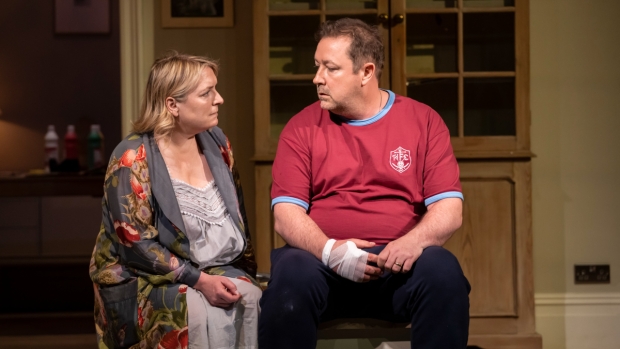Middle at the National Theatre – review
David Eldridge’s follow-up to ”Beginning” continues at the Dorfman Theatre until 18 June

© Johan Persson
Middle is playwright David Eldridge's companion piece to Beginning, his hit play of 2017, which showed a couple coming together after a party, and tentatively reaching out for love. This time, another couple, ten years later, are struggling with the realities of marriage, watching their relationship fall apart in the middle of the night.
The two plays – part of a now-planned trilogy – share qualities in common. Both take place over a single evening, as daylight approaches. Both feature favourite songs and some very bad male dancing. And both have a piercing truthfulness about the dark affairs of the human heart that make them compelling.
If Middle feels more effortful than Beginning, it's partly because the subject matter is heavier. Maggie (Claire Rushbrook) and Gary (Daniel Ryan) are a middle-aged couple going to seed and feeling that life has passed them by. They have a perfect home (slightly too pristine in Fly Davis's showroom setting) and a young daughter they both love. But when Maggie confesses she has met someone else and fears she no longer loves her husband, she sets in train a painful series of confessions and expressions of disappointments.
The writing is at times wonderfully acute and funny. Gary's tendency is to avoid confrontation; when Maggie first states her fears, he can barely tear his attention away from the pork he is planning to roast for a family meal the next day. It's the suggestion she had sushi with her would-be lover that he lands on, not the kiss they have shared. "I thought you didn't like sushi?" he says, plaintively. "Well, you know…I've given it a go." When they discuss separation, he remarks: "I don't think they do Conscious Uncoupling in Essex. Unconscious coupling, yep. But not the other way around."
Such lines liven the debate, which tends towards the serious. Maggie feels she has been isolated by childcare, reduced by being a mother. She senses there is another life just out of reach with a policeman lover, whom she describes as the kind of man who reads every book on the William Hill Sports Book of the Year shortlist. Gary is desperate to hold things together, to do whatever she wants to keep her. But in terms of personal choice, he struggles to get further than giving her a choice of vibrators.
In Ryan's wonderful performance, you feel the terrible tug of feeling that he is trying to suppress; his face is a constant reflection of wounded incomprehension and desperation that they can just keep plodding along. Rushbrook meanwhile makes Maggie a creature constantly on the move, her physical restlessness revealing the depth of her unhappiness.
Eldridge is clever too on the subtle nuance of class that separate the couple even before they begin to hit obstacles. Gary is an Essex wide-boy, who rode high in the city and is now stuck in a job he loathes; Maggie's parents – a teacher and a small business man – look down on his working class origins, and on the way he spoils their daughter.
But this recognisable honesty in the writing is undermined by odd notes of contrivance; Maggie's belief in the possibilities offered by her married suitor stretch credulity. Gary's deliberate obtuseness – "I only got up for a piss" – and willingness to do anything for her, doesn't feel grounded in the relationship you see in front of you. The conversation doesn't travel very far. That's true to life, but not necessarily riveting drama.
But Polly Findlay's direction, which keeps things taut and watchful, and the fine performances hold the attention as Rick Fisher's nuanced lighting charts the progress from night to day, and the play ends, like its predecessor, with a gleam of possibility.












